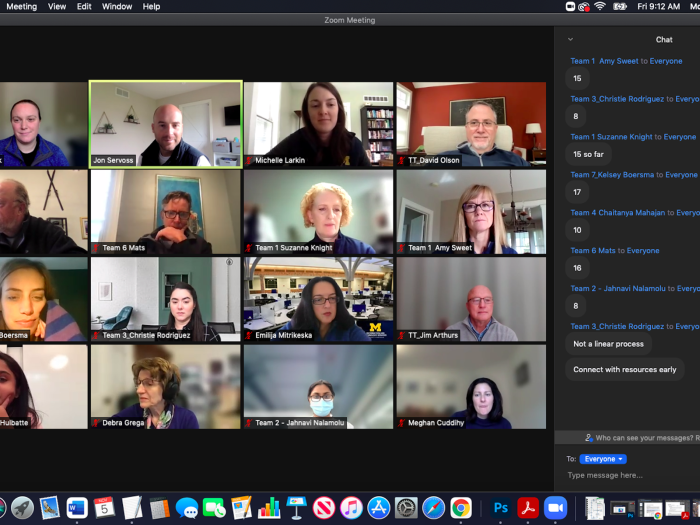From an initial funding search to the grant writing process to developing successful proposals, explore these helpful funding and proposal resources from the Medical School Office of Research and across campus.

The Funding & Proposal Development Route Map Green Line provides a snapshot of the resources available to research project teams at Michigan Medicine, and Grant Services & Analysis is committed to providing personal service that helps you navigate your own successful path. CLICK HERE to step back one level to the Project At-A-Glance Blue Line.
In partnership with the Medical School Office of Research, the U-M Office of Research & Sponsored Projects, U-M Foundation Relations, and Michigan Medicine Corporate & Foundation Relations, the U-M Library maintains the Research Funding & Grants Guide, a one-stop-shop for research funding resources. The site is a central, campus-wide portal for finding internal and external funding opportunities and for consultations on how to personalize your search and stay informed.
Need additional help? Schedule a funding search consultation.
The U-M Medical School Competition Space is an innovative online platform that streamlines the process of finding, and applying for, funding opportunities through the U-M Medical School.
The following opportunities are posted, and can be applied for, through UMMS Competition Space:
- Awards
- Bridging Support
- External Limited Submissions
- Other Opportunities
- Pilot Grants
The Michigan Medicine Corporate and Foundation Relations team can assist in connecting faculty to private funding opportunities, liaising between sponsors and researchers, guiding faculty on proposal approaches, providing examples of previously funded U-M proposals, and answering general faculty questions. For a wide range of Foundation and Corporate funding opportunities, visit their Competition Space or contact Joe Piffaretti, Senior Director, at piffaret@umich.edu.
The Michigan Institute for Clinical & Health Research (MICHR) enables and enhances clinical & translational research at U-M by offering many funding opportunities throughout the year. For more information, visit their website.
Fast Forward Medical Innovation helps biomedical researchers navigate the wide variety of funding opportunities available at U-M that will help move their research down a successful commercialization path, including:
- The statewide MTRAC for Life Sciences Innovation Hub
- Frankel Innovation Initiative
- Michigan Biomedical Venture Fund
- Idea Consultations
The Bridging Support program provides funding to continue federally funded biomedical research projects that demonstrate a likelihood of successfully competing for federal funding upon resubmission of A0 or A1 proposals. Bridging applications must address current NIH grant critiques or other sponsors’ (e.g., VA Merit) written comments and explain planned use of bridging funds. Priority will focus on financial need to maintain a defined research project and to retain key research personnel. Amounts of other support, internal resources, and start-up funds will be considered. For more information about the application process, visit the website.
Limited Submissions are funding opportunities where sponsors invite institutions to nominate a proposal (the number of proposals is predetermined by the Sponsor/Foundation - typically one to two). In order to select these proposals/or institutional nominees, the University coordinates internal competitions, and invites all eligible applicants to apply. If selected, the institutional nominee/s are invited to submit their grant application to the sponsor to compete (together with nominees from other institutions) for the award.
Limited Submission opportunities/competitions are managed by both the Medical School Office of Research and the U-M Office of the Vice President for Research.
Managing the business aspects of research takes a team of experts, and your first point of contact should always be your department Research Administrator (RA). Your RA can help with policies, processes, system, forms, and many other aspects of your research proposal.
- The Office of Research & Sponsored Projects (ORSP) can connect you with your department RA through their Blue Pages - a searchable form that identifies RAs by department.
- The Grant Services & Analysis unit in the Medical School Office of Research also maintains a list of department contacts.
Michigan Experts is a searchable database of research expertise across disciplines, offering a rich representation of the research knowledge and talent of over 5,000 faculty members across the University of Michigan.
Use the database to find researchers with specific areas of expertise for collaboration or mentoring, explore co-author networks, and connect with colleagues across the preeminent U-M research enterprise to expand your research network.
Research Development team members within the Medical School Office of Research design and implement services that help faculty become successful in obtaining and maintaining extramural funding and — once successful — share their expertise to help their colleagues do the same. Faculty members are encouraged to contact them for assistance with pre-award activities related to finding funding opportunities and to proposal development and editing. For more information, visit the Proposal Development page.
The Medical School Grant Proposal Sampler is a repository of successfully funded grant proposals provided by Medical School faculty members for NIH, federal, and foundation awards. The examples offer insight into proposal development, including writing (e.g. organization, detail), responding to reviewers’ comments, sample sections (biosketch, budget), etc. The platform also contains resources to assist in the development of NIH Data Management and Sharing Plans, as well as features lists of Medical School faculty members who currently serve or have recently served on NIH Study Sections. The site requires level-2 password access.
The Michigan Institute for Clinical & Health Research (MICHR) offers many grant writing services including:
- Research Development Consultations - Free in-person consultations offer personalized support and advice for your grant proposals or research ideas and are available to any U-M investigator.
- Grant Editing - MICHR's editor will carefully review your grant to identify red flags in the content; ensure logic, flow and clarity of ideas; eliminate jargon; improve sentence structure and grammar; and comment on unclear text.
- Letters of Support - Grant proposals may be strengthened by a letter of support detailing MICHR services you will use to meet the research goals outlined in your proposal.
The Office of Graduate & Postdoctoral Studies provides information and resources for the preparation of NIH Training Grant applications (e.g. T32, T35, R25, K12), along with resources for Training Program administration (Diversity, Responsible Conduct of Research, Rigor and Transparency in Research, and Professional Development).
With almost 70 NIH-supported Institutional Training Grants at the University of Michigan, these grants provide resources for training programs, which include committed participating faculty, competitively appointed trainees, and special events and activities for optimal training in specialized areas of biomedical research. Learn more.
The U-M Medical School Facility & Resource Profile Templates contain descriptions of units and resources at Michigan Medicine and elsewhere on campus. These boilerplate descriptions of U-M facilities and resources are intended to be copied, pasted, and edited as needed for grant proposals or marketing/recruiting materials.
The goal of the Proposal Preparation Funding Program is to provide funds to support the submission of large-scale, multi-investigator grants; this program is not designed to provide support for submission of individual R01-type grants. The funds may be used to offset the costs of hiring expert consultants or editors; coordinating and hosting brainstorming sessions; paying reviewers; or hiring temporary administrative and/or other services required to assemble and submit large proposals.
The Academic Writing & Research Development Series (AWARD) consists of articles published in UMMS Research News, the Medical School Office of Research's monthly newsletter. Topics cover proposal planning, proposal development and funding agency specifics.
The Grant Services & Analysis staff have experienced interdisciplinary proposal editors who will, as time permits, provide help editing external grant applications for grammar and grantsmanship issues. You may contact the staff by email (msgrants@umich.edu) or phone (734-763-4272).
The Michigan Institute for Clinical & Health Research (MICHR) provides personalized support and advice for your grant proposals or research ideas. Free, one-hour consultations can help you improve your research and funding success and are available to any researcher at the University of Michigan.
The Medical School Office of Research maintains a list of freelance editors and freelance graphics specialists who may be available to help prepare various documents, e.g., grant proposals, manuscripts, dissertations.
Grant Services & Analysis in the Medical School requests that all proposals be submitted to the office ten business days prior to the sponsor’s proposal deadline. This includes the cumulative time needed for both the Medical School GS&A Office to check the application and to meet the ORSP Deadline Policy for required review. CLICK HERE to learn more about grant routing deadlines.
Often proposals submitted to sponsors can be strengthened with a letter of support or a letter of commitment for cost sharing from the leadership of Michigan Medicine or the Medical School. In order to facilitate these requests, the Executive Vice President for Medical Affairs (EVPMA) will sign the letter on behalf of Michigan Medicine, and the Senior Associate Dean for Research will sign the letter on behalf of the Medical School.
The budgeting/costs resources provided by Grant Services & Analysis offer a variety of information on budgeting various types of proposals and includes a variety of topics from budgeting personnel to budgeting industry studies and clinical trials. They also provide budget templates to facilitate budgeting and translation of the budget into sponsor forms.
Grant Services & Analysis has curated information on many NIH topics such as preparing a Biosketch, Resubmission, Training (T) Grant, or Cover Letter. For more information, visit the NIH Specifics, Tips & Tricks page.
Grant Services & Analysis provides a list of definitions and explanations of how to use the Proposal Approval Form (PAF), Clinical Trial Routing Form (CTRF), and Unfunded Agreement (UFA) in eRPM. For more information, visit the Using eResearch Proposal Management (eRPM): PAFs, CTRFs & UFAs page.
REMEMBER: Your grant routing deadline is before the sponsor deadline. Use Grant Services & Analysis' Deadline Calculator to determine your school deadline.
ORSP requires proposals no later than four (4) business days in advance of the sponsor’s deadline date and time, and the Medical School Submission Policy requests all proposals arrive to Grant Services & Analysis seven (7) business days prior to the project being submitted by campus. This means that the Medical School deadline that should be added to the PAF is a total of ten (10) business days prior to the sponsor’s deadline.
For additional information on Streamlined Review Services, Proposal Review Checklists, Required Proposal Components, and Medical School Department Contacts & Authorized Signers, visit the Pre-Award page.
The Proposal Review Checklists can be used to verify the completeness of the documents required in a grant application prior to routing the proposal.
The Proposal Finalization Checklist provides you with key items to check before finalizing a proposal (reflective of issues commonly found prior to submission).
For more information, visit the Grant Services & Analysis Pre-Award page.
A Project Award Notice (PAN) is prepared and distributed by ORSP via eResearch to the Principal Investigator and all signers off on a PAF serves to establish the project/grant number (PGN) for the project. For more information, visit ORSP's Project Award Notice page.
Data Management and Sharing plans are required by the NIH. CLICK HERE to learn more about this requirement, including links to plan examples.











